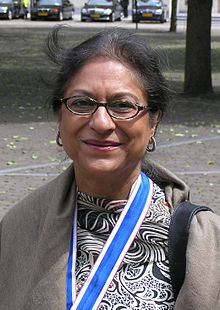On October 13-14, a two-day conference was held to pay tribute to Pakistan’s world renowned human rights activist, Asma Jahangir. The conference centered on the theme ‘Justice for Empowerment’ and was attended by human rights and civil society activists, political leaders and lawyers from around the world. Speakers included Pakistan Peoples Party chairperson Bilawal Bhutto Zardari, Awami National Party leader Afrasiab Khattak, federal minister for human rights Dr Shireen Mazari, former speaker of the National Assembly Ayaz Sadiq, Chief Justice of the Supreme Court, and former secretary general of the Human Rights Commission of Pakistan (HRCP) Ahsan Bhoon SC Bar Association President Kamran Murtaza.

Ambassadors from various countries also attended the conference, including HE Jean Francois Cautain (head of the European Union Delegation), HE Koebler (Germany), HE Ingrid Johansonn (Sweden), HE Margaret Adamson (Australia) and HE Ajay Bisaria (India). Among international guests who travelled to attend the conference were the Hon. Michael Kirby AC CMG (former justice of the High Court of Australia), Kirsty Brimelow QC (chair of the Human Rights Bar Committee, England and Wales), HE Annika Ben David (Sweden’s Ambassador at Large for Human Rights, Democracy and the Rule of Law), Kamla Bhasin (Indian poet and activist) and Dr Nimalka Fernando (attorney and women’s rights activist, Sri Lanka).
The two-day conference had nine different sessions where speakers shared ideas. The participants of the First Asma Jahangir Conference on Saturday resolved that the imposition of censorship in the name of national interests must end as it is detrimental to the fundamental rights.
According to a statement released by the Human Rights Commission of Pakistan “The conference resolved that the state must protect citizens’ fundamental rights, lift the ban on non-government organizations and cease the harassment of human rights defenders. All political parties must have a new charter of democracy to set ground rules for protecting the democratic process – and the major political parties must take the lead in doing so. Judicial overreach must be checked, since it impinges on the constitutional role of other state institutions. The Supreme Court must consider formulating parameters for taking suo moto notice. Freedom of expression must not be curtailed by the state and undeclared censorship of the print and electronic media must cease. Parliament must approve a new bill for the independence of PEMRA according to the recommendations of the Media Commission report.”
According to a news report: “The participants expanded their great gratitude to the vision and legacy of Jahangir while discussing the rule and law situation in the country. They devised strategies for the promotion of justice by strengthening the rule of law and democracy, protection of fundamental rights, ensuring the independence of judiciary and mainstreaming gender-related issues.”
According to former head of the Human Rights Commission of Pakistan, IA Rahman “the whole nation has become silent with the silence of Jahangir. While throwing light on her life, he admitted that she had great courage which could not be measured. “She was a voice of every voiceless. She was committed to defending democracy and rule of the law in the country.”
Awami National Party (ANP) leader Bushra Gohar, gave a speech during “Strengthening Democracy and Rule of Law” session, and “said that true democracy could not prevail in the country since the military had intervened throughout history either directly or indirectly. While criticising the Pakistan Tehreek-e-Insaf (PTI) government, she said that the situation has become worst for democracy in the country. “Chief justice and Imran Khan have become sandbags and there is a need to know who is behind them,” she added.”
Panelists from Pakistan, India, Sri Lanka, the Maldives, Nepal, and the United States (US) also “discussed cybercrime awareness, suggesting the need of improvement in the current data protection laws. Furthermore, the panelists also concluded that a distinction should be drawn between cybercrime and cyber-terrorism. “Academic Freedom and Freedom of Expression for Youth and Students” session concluded that there is a dire need to give importance to the autonomous academic freedom.”
Speakers at the “Freedom of Expression and Shrinking Spaces for Dissent” session “discussed the oppression and forced disappearances of journalists in Pakistan and around the world. The panel also concluded to empower Article 19 in its true letter and spirit. The “Justice for Empowerment” session included a panel discussion on the outdated and discriminatory labour laws and its effects on the working women.”
According to HRCP: “Pakistan must implement legislation to criminalize forced disappearances. The government must prevent the use of torture by adopting the 2014 bill passed by the Senate. The conference resolved that the Commission of Inquiry on Enforced Disappearances must prosecute the 153 identified officials responsible for enforced disappearances. The conference also resolved that there was a disproportionately large population of under-trial prisoners, which represented a deep flaw in the justice system.”
Further, “Pakistan must revise the education syllabus to remove portions that discriminate against religious minorities. The state’s appeasement of religious fundamentalism must end and the Christian minority must be protected in the face of new threats. Laws that discriminate against minorities must be abolished.”
And, “the law on sexual harassment against women in the workplace is not being implemented: there are hardly any cases under this act before the ombudspersons despite numerous women reporting sexual harassment. The law should be refined to introduce the crime of “sextortion” and sexual bribery as introduced in Bangladesh. On transgender rights, the conference resolved that the Transgender Persons Act 2018 must be implemented in letter and spirit. It was recommended that a monitoring body for the implementation of current protection laws for the transgender community be established. Broad-based measures must be taken by the government, media, civil society, essential service providers and the education sector to increase awareness of transgender persons and their rights across society.”
![]()





